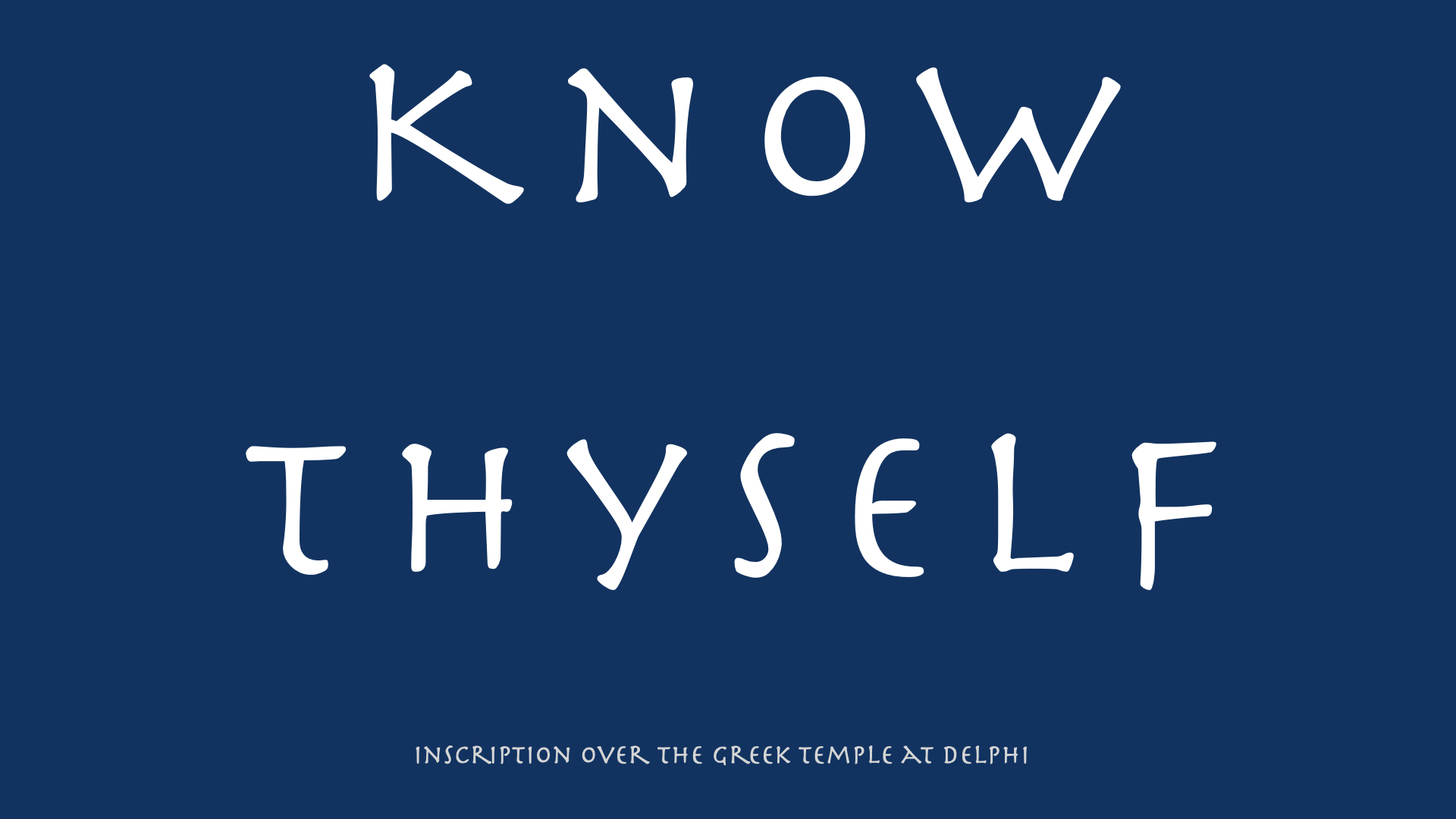|
|
Answers to the Self-Denial Bible Study
This page provides answers to the Self-Denial Bible study. It's the first of four lessons in the Who Am I Bible Study. We provided daily study questions for this lesson here. At the bottom of this page we offer you the opportunity to compare your answers for your Self-Denial Bible study.
Day One of the Self-Denial Bible Study

Question 1: Over twenty years ago, the Baker Encyclopedia of Psychology and Counseling observed that: "Narcissism is often glorified, and the media thrust such persons at us as role models. Yet this is also a time in which people struggle with a despairing sense of lost or undeveloped self."
How does society encourage us to avoid self-denial? Can you cite any examples? How have you have avoided their influence?
Answer:
Your answer goes here.
One Man's Answer: Perhaps the "selfie" offers no better example. Modern society has taken to the public publication of our self-images as a normal daily activity on social media platforms. While there's nothing wrong with celebrating a good time and a happy life, our self-focus can often bleed into the disease of vain self-promotion. When we are asked to take a "selfie" perhaps we should pair it with a Scripture or reference to a biblical principle. Think about it. When you get to heaven, there won't be any need to take a selfie with Jesus.

Question 2: In this Self-Denial Bible Study we should not that the actual word "self-denial" is found rarely in the Old Testament, and only in Leviticus in the Christian Standard Bible.
However, there are several examples of the concept being played out in the lives of notable figures. Here's some examples:
- Abraham, when he accorded to Lot, his junior, his preference of the land of Canaan, Gen. 13:9, with 17:8.
- Moses, in choosing rather to suffer affliction with the people of God than enjoy the pleasures of sin, Heb. 11:25; in taking no compensation from the Israelites for his services, Num. 16:15.
- Samuel, in his administration of justice, 1 Sam. 12:3, 4.
- The widow of Zarephath, in sharing with Elijah the last of her sustenance, 1 Kin. 17:12–15.
- Daniel, in his abstinence, Dan. 1:8; in refusing rewards from Belshazzar, Dan. 5:16, 17.
- Esther, in risking her life for the deliverance of her people, Esth. 4:16.
- The Rechabites, in refusing to drink wine or strong drink, or even to plant vineyards, Jer. 35:6, 7.2
Read Leviticus 16:29-31 and 23:27-32. Here we see the commandment of Moses to the Israelites to deny themselves.
For what reasons did God have Moses instruct the Israelites to deny themselves, and how often were they told to do so?
Answer:
They Israelites are instructed to deny themselves once a year on a particular day (vs 29) to cleanse themselves from their sins (vs 30).
Different translations render the commands for the Israelites in Leviticus 16, verses 29 and 31 as follows:
- Christian Standard Bible - practice self-denial
- New American Standard - humble your souls
- New King James Version - afflict your souls
- New Living Translation - deny yourselves
- New International Version - deny yourselves
- English Standard Version - afflict yourselves
Chapters 16 and 23 of Leviticus both relate to the Day of Atonement, which is referred to by its Hebrew name today as "Yom Kippur". This was a yearly event that took place on a single day, the tenth day of the seventh month (Leviticus 16:29).
The day was the most solemn of all the Old Testament rituals. So significant was it that in later Jewish tradition it came to be called just that, “The Day”.
On this day the Israelites denied themselves and abstained from work (16:29, 31). The admonition to “deny yourselves” has been traditionally understood to refer to fasting. This is thus the only fast day in the Mosaic Law.
Rabbinic interpretations of the Mosaic law, on the other hand, listed four additional activities from which the Jews were to abstain:
- bathing
- use of oil on body
- wearing shoes
- sexual intercourse1
Surely you desire integrity in the inner self,
and you teach me wisdom deep within.
Psalm 51:6
2020. Christian Standard Bible. Nashville, TN: Holman Bible Publishers.
Day Two of the Self-Denial Bible Study

Question 1: In the second chapter of the Book of Ecclesiastes, Solomon explains his experience with not withholding any pleasures from himself. Read Ecclesiastes 2:1-11.
What were the pleasures he pursued in the following verses 2 through 8?
What was the end result of his experience from verses 1-11?
Answer:
Here's the answer to the pleasures he sought from the Christian Standard Bible:
- Verse 2 - laughter
- Verse 3 - wine
- Verse 4-6 - achievements (houses, vineyards, gardens, parks, every kind of fruit tree, reservoirs, and groves of flourishing trees)
- Verse 7 - male and female servants, slaves, livestock,
- Verse 8 - silver, gold, treasure, male and female singers, many concubines
Solomon indulged himself with all that the world could provide him; yet he found it was all futile (vs 11). Wisdom is not futile, but pleasures are indeed - see verse 9.
Question 2: One method of self-denial for Christians is fasting. The idea of fasting is found throughout the Bible. We see fasting commanded on the Day of Atonement in the Old Testament and practiced habitually in the New Testament (see Matthew 9:14, Mark 2:18, Luke 2:37, Acts 10:30).
If we studied why the people were fasting we would see that there were different reasons. For example,
- Moses fasted when he interceded on behalf of the Israelites (Deuteronomy 9:18)
- The residents of Jabesh-gilead fasted for seven days after Saul and his sons were slain by the Philistines (I Samuel 31:13)
- David humbled himself, prayed and fasted when he was afflicted by his enemies (Psalm 35:13)
- The church at Antioch prayed and fasted when they ordained Paul and Barnabas for missionary work (Acts 13:3)
Why should we fast? Also, how did Jesus command us to fast in Matthew 6:16-18? Finally, what spiritual benefit have you personally received when fasting?
Answers:
First, we fast to improve our perspective that we might be humble and more dependent on God as we pray. Fasting is not a means to lose weight or to be found pious by others. Fasting is done to humble ourselves, to deny ourselves, and to appeal to God for his favor (Isaiah 58:1-6).
As Craig Keener notes: "If we want our credit with God, we need to be satisfied that he alone knows, for we can trust that his reward will be more than adequate."2
Jesus instructed us to fast in Matthew 6:16-18:
Whenever you fast, don’t be gloomy like the hypocrites. For they make their faces unattractive so that their fasting is obvious to people. Truly I tell you, they have their reward.
But when you fast, put oil on your head and wash your face, so that your fasting isn’t obvious to others but to your Father who is in secret. And your Father who sees in secret will reward you. 2020. Christian Standard Bible. Nashville, TN: Holman Bible Publishers.
So the answer to both questions above is found in this Scripture. First, fasting is a personal and private practice. It's shouldn't be a public thing.
But in the ancient world fasting was often done publicly to show humility and sorrow, signified by "garments of sackcloth, ashes sprinkled on one's head, unwashed hands, and an unanointed head were signs a person was observing a fast."3
Perhaps this public display (as described by Jesus in Luke 18:12) grew from the acceptable and expected public corporate practice of humbling oneself on The Day of Atonement. Perhaps from that acceptable public practice it crept into an unacceptable individual public practice by some.
Finally, what spiritual benefit have you personally received when fasting?
Day Three of the Self-Denial Bible Study

Question 1: Jesus offers the greatest challenge to self-denial to his followers in Mark 8:34-38. Here he explains what Christians must do to become his followers.
What are the three things he says his followers must do in this passage to be his disciple?
Answer:
Mark 8:34-38 (CSB)
34 Calling the crowd along with his disciples, he said to them, “If anyone wants to follow after me, let him deny himself, take up his cross, and follow me.
35 For whoever wants to save his life will lose it, but whoever loses his life because of me and the gospel will save it.
36 For what does it benefit someone to gain the whole world and yet lose his life?
37 What can anyone give in exchange for his life?
38 For whoever is ashamed of me and my words in this adulterous and sinful generation, the Son of Man will also be ashamed of him when he comes in the glory of his Father with the holy angels.”
In verse 34, Jesus commands that those who wish to be his followers must:
- deny themselves
- take up their cross
- follow him
Jesus commands the same three-step course of discipleship in the gospels of Matthew (Matthew 16:24) and Luke (Luke 9:23).
The call to discipleship is summarized in three commands in the Greek text:
- arnesatho (to deny oneself)
- arato (to take up)
- akoloutheito (to follow)
The tense sequence of these three verbs (two aorist followed by a present indicative) demonstrates that the essential decisions made regarding the self and about day-to-day living i.e. bearing of one's cross, "emerge in a continual following of Jesus. The disciple's life consists of basic self-denial." 4
Question 2: Jesus offers the explanation that if someone wants to follow him he must lose his life. But then he explains that if he does lose his life, he will in fact save his life (verse 35).
How can this be explained? The cross signified crucifixion and the Jews living during Jesus' time were very familiar with this cruel method of execution. To help us understand the context of this passage, the Zondervan Illustrated Bible Backgrounds Commentary offers the following insights:
"In the first century, crucifixion was one of the most feared forms of execution, used effectively by the Romans as one of the strongest forms of deterrence against insurrection or rebellion. It was a dreadful way to die.
Condemned victims were often forced to carry a cross-beam to the scene of the crucifixion. They were nailed to it, which in turn was nailed to the upright beam, which was then hoisted into place.
The horror of the cross will be Jesus' own tragic fate, but in what must have been to the disciples a shocking shift of emphasis, Jesus uses the cross and crucifixion as an image of discipleship." 5
How could the disciples have made sense of this command by Jesus; and equally as important, how can modern day Christians make sense of this command to "take up our cross" every day?
Answer:
Obviously, the command is not a literal one. Our bodies can't be put to death every day by crucifixion. Although we may suffer a terrible death for our faith like Jesus did, it wouldn't be a daily occurrence - we can only die once.
It's a metaphor that signifies "one is to live on a daily basis as though one has been sentenced to death by crucifixion." 6 Luke's gospel helps us understand this with the addition of the term "daily" - Jesus commands his followers to pick up our cross "daily" (see Luke 9:23).
Darrell Bock offers that:
"The call to follow Jesus continually. One can go the route Jesus goes if one recognizes the need to place oneself in God's care and submit to him. Such submission includes a willingness to enter into the suffering of rejection. Jesus makes it clear that the essence of discipleship is found in this attitude." 7
Jesus gave his up his life voluntarily and we need to do the same. As we read further in the gospel of Mark, we see in verse 35 that we must deny ourselves to save ourselves. Ironic isn't it? But it's a must!
Jesus says in Luke 14:27 that whoever doesn't bear his own cross and follow him can't be his disciple. Moyer Hubbard offers this insight on the difficulty some assume the original disciples may have had in being Jesus' disciples:
"The logic of the cross demands a life lived for others. One of the appeals of the gospel, I suggest, was not that it was easy but that it was difficult and entailed hardship and sacrifice. It appealed to humanity's higher instincts and intuition, which understands that a life consumed with self is not a life that consumes itself." 8

Day Four of the Self-Denial Bible Study
Question:
The Bible teaches us that Christian life involves three deaths. One is legal, one is moral, and another is physical.
Research these Scriptures.
Identify exactly how the Christian is to be involved in these three different deaths.
The First Death:
- Romans 6:6, 11
- Colossians 3:5
The Second Death:
- Matthew 16:24
- Colossians 2:20
The Third Death:
- II Corinthians 4:7-12
- II Corinthians 4:16
Answer:
John Stott in his book The Cross of Christ provides the following on the three deaths. He notes that they aren't just three deaths, because they are accompanied by three resurrections. He states all three are integral to the Christian experience. Here's an excerpt from his book to help us understand this:
"The first death is the death to sin and subsequent life to God, which happens to all Christians by virtue of our union with Christ in his death and resurrection. By it we share in the benefits both of Christ's death (its forgiveness) and of his resurrection (its power). This is inherent in our conversion/baptism.
The second is the death to self, called variously taking up the cross, or denying, crucifying or mortifying ourselves. As a result, we live a life of fellowship with God. This death is not something that has happened to us and that we are now told to 'reckon' or remember, but something we must deliberately do ourselves, though by the power of the Spirit, putting our old nature to death.
Indeed all Christians have done it in the sense that it is an essential aspect of our original and continuing repentance, and we cannot be Christ’s disciples without it. But we have to maintain this attitude, that is, take up the cross daily.
The third kind of death and resurrection . . . is the carrying about in our bodies of the dying of Jesus so that the life of Jesus may be revealed in them. Plainly the arena for this is our bodies. It refers to their infirmity, persecution and mortality.
It is in this connection that Paul could say both 'I die daily' (1 Cor 15:30–31) and 'we face death all day long' (Rom 8:36). For it is a continuous physical frailty. But then the “resurrection,” the inward vitality or renewal from the life of Jesus within us, is continuous too (2 Cor 4:16).
To sum up, the first death is legal; it is a death to sin by union with Christ in his death to sin (bearing its penalty), and the resultant resurrection with him leads to the new life of freedom which justified sinners enjoy.
The second death is moral; it is a death to self as we put to death the old nature and its evil desires, and the resurrection that follows leads to a new life of righteousness in fellowship with God.
The third death is physical; it is a death to safety, a 'being given over to death for Jesus’ sake,' and the corresponding resurrection is Jesus’ strength which he makes perfect in our weakness. The legal death was a 'death unto sin once and for all,' but the moral and physical deaths are daily—even continuous—experiences for the Christian disciple." 9

Day Five of the Self-Denial Bible Study
Question:
What is something you can do daily to deny yourself in order to bring glory to God?
Secondly, how can you avoid bringing glory to yourself in doing so?
Answer:
One man's answer:
Seek God's will instead of your own. Pray daily. Seek the good of others.
Perhaps on a non-daily schedule: Donate to the church anonymously, fast privately, and live modestly so as to be able to give generously.
As a closing thought to this Self-Denial Bible Study, we should remember that although we may struggle with this battle to deny ourselves, we can take comfort that Jesus cannot deny himself (II Timothy 2:13).

Notes for the Self-Denial Bible Study
Please know that as an Amazon Associate we earn from qualifying purchases linked on this site.
|
1 Rooker, Mark F. 2000. Leviticus (The New American Commentary). Vol. 3A. Nashville: Broadman & Holman Publishers. |
 |
|
2 Keener, Craig, S. Matthew, The IVP New Testament Commentary Series. 1997: Downers Grove, IL: Inter-Varsity Press. p. 147. |
 |
|
3 Packer, J.I. and Tenney, M.C. (eds). Illustrated Manners and Customs of the Bible, 1980: Nashville, TN: Thomas Nelson Publishers. |
 |
|
4 Bock, Darrell, L. Luke 1:1-9:50, Baker Exegetical Commentary on the New Testament. 1994: Grand Rapids, MI: Baker Academic. p. 852. |
 |
|
5 Wilkins, Michael, J. Matthew. 2002. Zondervan Illustrated Bible Backgrounds Commentary. Grand Rapids, MI: Zondervan. p. 105. |
 |
|
6 Green, Joel, B. 1997. The Gospel of Luke, The New International Commentary on the New Testament. Grand Rapids, MI: Wm. B. Eerdmans Publishing Co. p. 373. |
 |
|
7 Bock, p. 853. |
|
8 Hubbard, Moyer, V. 2010. Christianity in the Greco-Roman World. Grand Rapids, MI: Baker Academic. p. 235. |
 |
